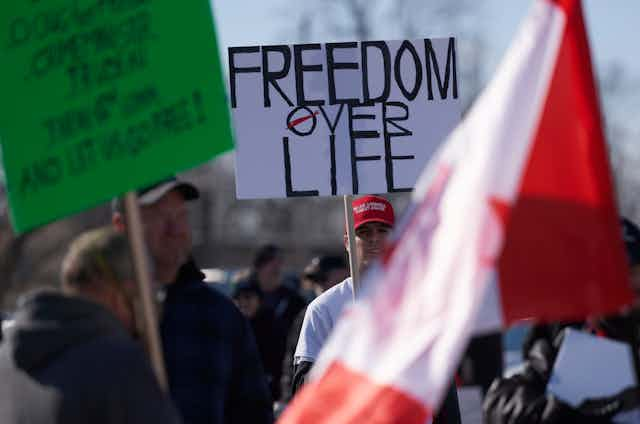Social relationships can fall apart in times of crisis. Canadians were among the world’s most trusting people prior to the pandemic. But have they remained trustful during the pandemic?
Our recent research shows the pandemic has created greater socioeconomic divisions when it comes to trust among Canadians.
Canadians at the high end of socioeconomic status have become even more trusting. But trust is declining among people who are economically vulnerable.
Social trust and how it matters
Trust reflects a belief in the goodness of human nature. Those who have trust in others think that most people in society are honest and reliable. Those with little trust may have doubts about other people’ intentions even when it comes to saying good morning with a smile in an elevator.
Generalized social trust is trust in people we don’t know.
Societies with more trust often perform better economically and politically and have rich and healthy citizens. In times of crisis, trust helps facilitate collective action. Lack of trust, on the other hand, often causes disruptions of community interactions, public panic and fragmentation.
Growing research suggests that people who trust have been essential to a successful pandemic response. Trusters are more likely to wear masks and get themselves vaccinated. Communities with more trust have lower infections and lower deaths.
Trust also helps prevent the negative effect of the pandemic on people’s mental health. This is because trusters tend to have more friends and feel more connected with others. An elevated sense of social support helps trusters better cope with the stress.

Still trusting during COVID-19?
Canadians were among the world’s most trusting people prior to the pandemic. The commonly used measure of trust asks respondents:
“Generally speaking, would you say that most people can be trusted, or that you can’t be too careful in dealing with people?”
Surveys before the pandemic consistently showed that over half of Canadians said most people can be trusted. This compared to the U.S., where only about 30 per cent of Americans were trusting.
But the pandemic may have sapped Canadians’ sense of trust. They were warned to maintain social distance in the event their friends and co-workers posed a health threat. Increasing numbers of protests and the trucker occupation of Ottawa further signalled Canadians’ potential loss of trust.
Two years of surveys
Our research tracked Canadians’ trust before and during the COVID-19 pandemic.
Since 2019, and throughout the pandemic, we have repeatedly surveyed thousands of Canadians about their trust in others. The first survey was conducted in September 2019 with 2,500 workers. We’ve surveyed the same workers another 10 times, from April 2020 to October 2021. Following the same people over time has let us look at how their sense of trust in others has changed.
There wasn’t one type of change in people’s trust. Instead, there were three different types of change.
About 22 per cent of our sample lost trust during the pandemic. Their trust never recovered.
Most Canadians actually gained trust during the pandemic or maintained the trust they had before the pandemic.
What seemed to be critical in differentiating these groups was how trusting they were before the pandemic. People who were low in trust before the pandemic lost more trust. People who were highly trusting became even more trusting.

Socioeconomic divisions in trust
It may seem like the solution is to ensure people have trust before a crisis, but it’s not that simple.
We looked at different markers of people’s socioeconomic status before the pandemic. We combined measures like income and how much trouble people had paying bills into one overall indicator of how well-off people were.
The importance of socioeconomic status was clear — when people are well off, they are far more likely be in the group that’s become more trusting. People at the low end of socioeconomic status tended to be the ones who lost trust.
What this pattern shows is how trust has become more divided in Canada. People who are economically advantaged before the pandemic had more trust to build on. People who were in financially precarious positions lost what little trust they had.
Read more: Income inequality and COVID-19: We are in the same storm, but not in the same boat
Growing trust gap can be harmful
Canada needs trust to survive. We’ve already seen how this loss of trust can harm Canada.
The occupation of Ottawa and the shutdown of the border in Alberta and Ontario are about a loss of trust. People lost trust in political leaders and others who supported pandemic responses like masking and vaccine requirements.

The result was the grinding halt of the economic and political levers necessary for a healthy society. International trade was slowed, and the seat of national politics was frozen.
If we don’t address this trust gap, Canada may be in for more chaos. People who are distrustful are at risk of even greater losses in trust. Further losses in trust are likely to weaken fundamental political economic and political institutions, undermining the basic stability of the nation.
Whether the loss of trust can be regained is an open question. But what is clear is that simply trying to convince people to trust the basic institutions of Canada and each other is not enough. Economic divisions create a trust divide that threatens Canadians’ way of life.
Canada is facing a historic rise in inflation that is further putting financial well-being at risk for many people. These financial precarities may not simply mean more economic hardship. They may also mean further losses of trust that can undermine national stability.

